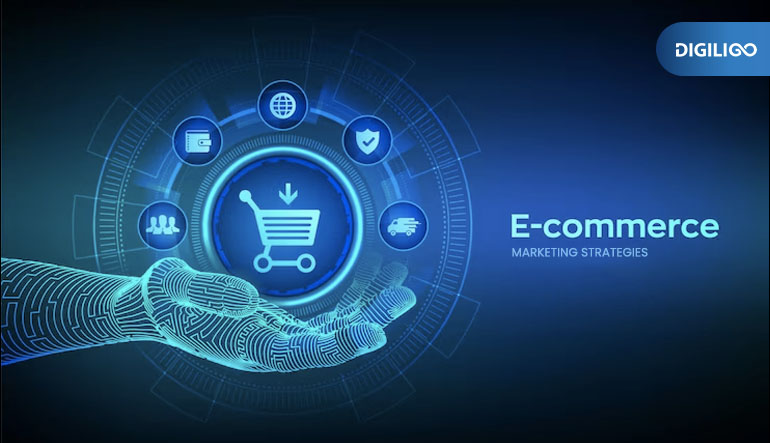Are you ready to unlock the true potential of your e-commerce clothing website with the best marketing strategies?
Do you want to stand out in the ever-growing digital marketplace and capture the hearts of fashion-forward customers?
Welcome to the world of fashion, where creativity intertwines with technology, and style knows no bounds. Today e-commerce clothing websites have emerged as the go-to platform for fashion enthusiasts worldwide. To succeed in the fiercely competitive fashion industry, brands must master the art of marketing strategies for e-commerce.
Let us embark on a poetic journey through the digital wonderland of e-commerce clothing websites, where creativity dances hand-in-hand with strategy, leaving an indelible mark on the world of style.
In this article, we will unveil the most effective marketing strategies for e-commerce that will elevate your online clothing business to the highest echelons of success.
Now, you must be wondering.
Why do we need marketing strategies for E-commerce clothing websites?
Marketing strategies are essential for E-commerce clothing websites for several reasons:
Boost Brand Visibility:
A well-planned marketing strategy helps in increasing the online visibility of your clothing brand. By employing various digital marketing channels such as social media, search engine optimization, and influencer marketing, you can reach a wider audience and attract potential customers to your website.
Drive Traffic to Your Website:
Marketing strategies for e-commerce drive targeted traffic to your E-commerce clothing website. This increased traffic not only enhances the chances of potential conversions but also improves your website’s overall ranking on search engines.
Build Customer Engagement:
Engaging your audience is crucial for creating a loyal customer base. Marketing strategies that include interactive content, personalized email campaigns, and social media interactions encourage customers to stay connected with your brand.
Increase Sales and Conversions:
Effective marketing strategies for e-commerce lead to an increase in sales and conversions. By highlighting your unique selling propositions and offering attractive discounts or promotions, you entice visitors to make purchases on your website.
Stay Ahead of Competitors:
In the fiercely competitive E-commerce clothing industry, marketing strategies give you a competitive edge. When you adopt innovative and creative marketing techniques, you position your brand as a leader in the market.
Establish Trust and Credibility:
Customers tend to trust brands that have a strong online presence. Through marketing efforts that showcase your products, share positive customer reviews, and highlight your brand’s values, you can establish trust and credibility among potential buyers.
Understand Customer Behavior:
Marketing strategies for e-commerce often involve data analysis, which helps you gain valuable insights into customer behavior and preferences. This data-driven approach allows you to tailor your marketing campaigns to suit your target audience’s needs effectively.
Adapt to Changing Trends:
The fashion industry is dynamic, with trends constantly evolving. Effective marketing strategies for e-commerce businesses allow you to adapt to these changes quickly and keep your product offerings relevant and appealing to your customers.
Create a Memorable Brand Image:
A carefully crafted marketing strategy helps in creating a memorable brand image. Consistent branding across different platforms and channels ensures that your clothing brand remains etched in the minds of your audience.
Foster Customer Loyalty:
Loyal customers are the backbone of any successful business. Marketing strategies for e-commerce that prioritize customer retention through loyalty programs, personalized discounts, and exceptional customer service contribute significantly to fostering customer loyalty.
Now that we understand why it’s important to have tailored made marketing strategies for e-commerce websites, let’s take a look at some of the best marketing strategies we can follow.
In this section, we’ll get to the point, looking at various marketing strategies for e-commerce businesses to help your clothing website shine like a star in the fashion galaxy.
Embrace Omnichannel Marketing: Redefining Fashion Retail
In today’s interconnected world, your brand must create a seamless shopping experience across all channels, whether it’s your website, social media platforms, or physical stores. Embrace the power of omnichannel marketing to attract potential customers from every corner of the digital realm.
Harness the Power of Social Media: Fashion Trends Gone Viral
Fashion and social media are a match made in heaven. Utilize the visual allure of platforms like Instagram, Pinterest, and TikTok to showcase your latest collections, engage with fashion influencers, and create a community of style enthusiasts. You can also take benefit of Facebook ads for E-commerce businesses to reach out to more and more audiences in the fashion space.
Content Marketing: Crafting Compelling Fashion Narratives
Tell captivating stories that resonate with your target audience through blogs, videos, and interactive content. Highlight the craftsmanship behind your clothing, share fashion tips, and keep your audience engaged with your brand.


Search Engine Optimization (SEO): Dressing Up for Google
Ensure your e-commerce clothing website ranks high in search engine results with the right mix of relevant keywords, meta-tags, and optimized content. A well-optimized website will attract organic traffic and increase your online visibility. Here’s the guide on SEO for E-commerce websites as the organic marketing strategies for e-commerce business.
Pay-Per-Click (PPC) Advertising: Paying for Click-Worthy Fashion
Amplify your brand’s reach with PPC campaigns on platforms like Google Ads and social media. Target specific demographics and boost traffic to your website while keeping a close eye on your budget.
Creating Video Content
Video content has become a dominant force in digital marketing. Consider creating engaging videos that showcase your clothing items in action, provide fashion tips, or share behind-the-scenes glimpses of your brand. Videos have a higher chance of going viral and can lead to increased brand exposure.
Email Marketing: Personalized Fashion Statements
Build a strong email marketing strategy to nurture relationships with your customers. Send personalized offers, exclusive discounts, and fashion recommendations based on their preferences.
Optimizing for Mobile Devices
With the increasing use of smartphones for online shopping, optimizing your e-commerce clothing website for mobile devices is crucial. Ensure your website is mobile-friendly, with fast loading times and an intuitive user interface.
A complicated checkout process can lead to cart abandonment. Streamline your checkout process, making it quick and user-friendly. Offer various payment options and ensure the security of customer data to build trust.
Influencer Collaborations: The Power of Fashion Ambassadors
Join forces with fashion influencers and celebrities to create a buzz around your brand. Their endorsement can elevate your e-commerce clothing website to new heights and attract a loyal fan base.
User-Generated Content (UGC): The Fashion Tribe
Encourage your customers to share their experiences through reviews, testimonials, and social media posts. UGC builds trust and authenticity, influencing potential buyers to make a purchase.
Influential Blogging: The Fashion Collaboration
Join forces with influential fashion blogs to create a synergy of style. Pen captivating guest posts and style guides that resonate with fashionistas everywhere. Conquer the fashion blogosphere with guest blogging and style tips.
Utilizing Retargeting Ads
Implement retargeting ads to remind visitors who didn’t purchase your products. These ads can appear on other websites they visit, enticing them to return to your website and complete their purchase.
Limited-Time Offers and Flash Sales: The Fashion Frenzy
Create a whirlwind of excitement with limited-time offers and flash sales. Ignite a sense of urgency that makes fashionistas grab their wallets. Set the stage for a shopping frenzy with time-limited discounts and flash sale events.
Virtual Try-On Technology: Fashion’s Virtual Mirror
Step into the virtual dressing room with augmented reality try-on solutions. Let your customers see themselves in your designs before making a purchase. Transform the shopping experience with AR try-on and virtual fitting.
Social Media Contests and Giveaways: Fashion’s Viral Phenomenon
Host social media contests and giveaways that make your brand go viral. Make the world fall in love with your fashion with Instagram contests and Facebook giveaways.
Analyzing and Optimizing marketing strategies for E-commerce business.
Regularly analyze the performance of your marketing campaigns using analytics tools. Identify which strategies are driving the most significant results and optimize your marketing efforts accordingly.
Showcasing Customer Testimonials
Displaying customer testimonials and reviews on your website can build trust and credibility. Encourage satisfied customers to leave reviews and share their experiences. Display the number of satisfied customers, social media followers, and positive reviews on your website. Social proof enhances credibility and convinces potential customers to make a purchase.
Conclusion
Marketing strategies are indispensable for E-commerce clothing websites looking to thrive in the competitive online fashion industry. By adopting effective marketing techniques, you can boost brand visibility, increase website traffic, drive sales, and build a loyal customer base.
Remember to stay updated with the latest trends and customer preferences to maintain a strong online presence and foster lasting relationships with your audience.
FAQs on Marketing strategies for e-commerce business
Q: How Can I Increase Traffic to My E-commerce Clothing Website?
A: You can increase traffic to your e-commerce clothing website by focusing on SEO techniques, content marketing, social media engagement, influencer partnerships, and hosting fashion events.
Q: Which Social Media Platforms Should I Use for Marketing My Clothing Website?
A: Choose social media platforms that align with your target audience’s preferences. Instagram and Facebook are popular choices for fashion brands but consider other platforms like Pinterest and TikTok for visual and interactive content.
Q: How Do I Optimize My Product Descriptions for Better Conversion Rates?
A: Optimize your product descriptions by using persuasive language, highlighting the benefits, and including relevant keywords. Utilize high-quality images and consider providing size charts and detailed product specifications.
Q: What Role Does Content Marketing Play in E-commerce Marketing?
A: Content marketing is crucial for e-commerce websites as it establishes brand authority, attracts organic traffic, and engages potential customers. Through blogs, videos, and other content formats, you can offer value to your audience and build trust.
Q: How Do I Measure the Effectiveness of My Marketing Campaigns?
A: Use web analytics tools to track website traffic, conversion rates, and other key performance indicators (KPIs). Analyze the data regularly to understand which marketing strategies are yielding the best results.
Q: Should I Use Paid Advertising for My E-commerce Clothing Website?
A: Paid advertising, such as Google Ads and social media ads, can be beneficial for quickly reaching a larger audience. However, balance paid advertising with organic marketing efforts to maintain a healthy marketing mix.




One Comment